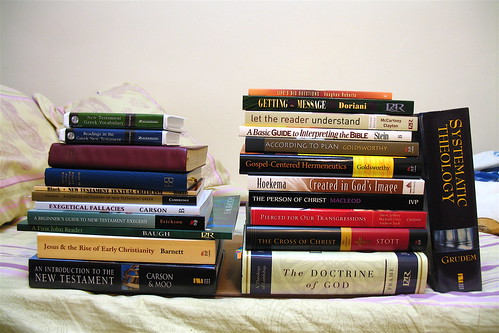Strangely, some church people are suspicious of theology. To some, “theology” is like a dirty word, something distasteful to be avoided. They view theology as something always dry and religious, prone to quench the Spirit, something to be held with contempt and possibly even feared.
To some extent, I understand where this perspective comes from. Much of academic theology is dry, and not all of it is helpful. But I think the attitude that I described above is an overreaction and an unhelpful generalization.
A few years ago I gradually worked my way through Wayne Grudem’s excellent Systematic Theology. Getting through this 1200+ page bohemoth took me longer than I would like to admit, but it was well worth the time.

Within it’s pages Grudem takes great pains to establish each point with references to Scripture, and on several issues even presents alternative views. Through my study of this book, I gained a much better understanding of the attributes of God, the tension between the unity and purity of the Church, and was exposed to several different views on Creation and the End Times (among other things).
In short, this book has helped me tremendously. Since reading it, I have referred back to it often.
Scripture provides explicit instructions for leaders to take great care with doctrine. Paul urged Timothy saying “Watch your life and doctrine closely. Persevere in them, because if you do, you will save both yourself and your hearers.” (I Timothy 4:16)
Timothy was a leader of what seems to be one of the healthiest churches of the first century. He was also and a disciple of Paul, an Apostle, and probably the greatest Christian missionary in all of history. If Timothy needed to watch his doctrine closely, why would we need to do any less?
Note: Paul did not tell Timothy to just watch his life, and ignore doctrine. Conversely, he also didn’t say “get tunnel vision on doctrinal issues to the point where you are ignoring your life.” There is a clear Biblical emphasis on BOTH holy living AND sound doctrine.
Some presume to be led the the Spirit in such a way that diminishes their dependence on Scripture. (Few are bold enough to actually say such a thing, but this is their general attitude.) Others emphasize the study of Scripture, and doctrinal orthodoxy, but seem to have little experience or desire to experience the Holy Spirit himself. Mere intellectual knowledge should never be our end goal.
I believe that both of these alternatives are unacceptable. We need believers who are Bible-saturated, doctrinally solid, Spirit-filled and Spirit-led.
I believe the written Word of God is just as important now as it was during the early decades of the church. God, in his kindness, has sovereignly preserved them for over 2,000 years, and not without divine purpose.
We need to study them so that we can know how to live. At it’s best systematic theology is a holistic look at the entirety of scriptural teaching to instruct us what God expects of us.
To both interpret it rightly and apply it wisely we need the Holy Spirit. The Holy Spirit and the written word of God are both essential. These two essentials should never be put at odds.
Question: Do you agree or disagree with my statement that many Christians tend to diminish the role of either the Holy Spirit or the Bible? Why or why not?
